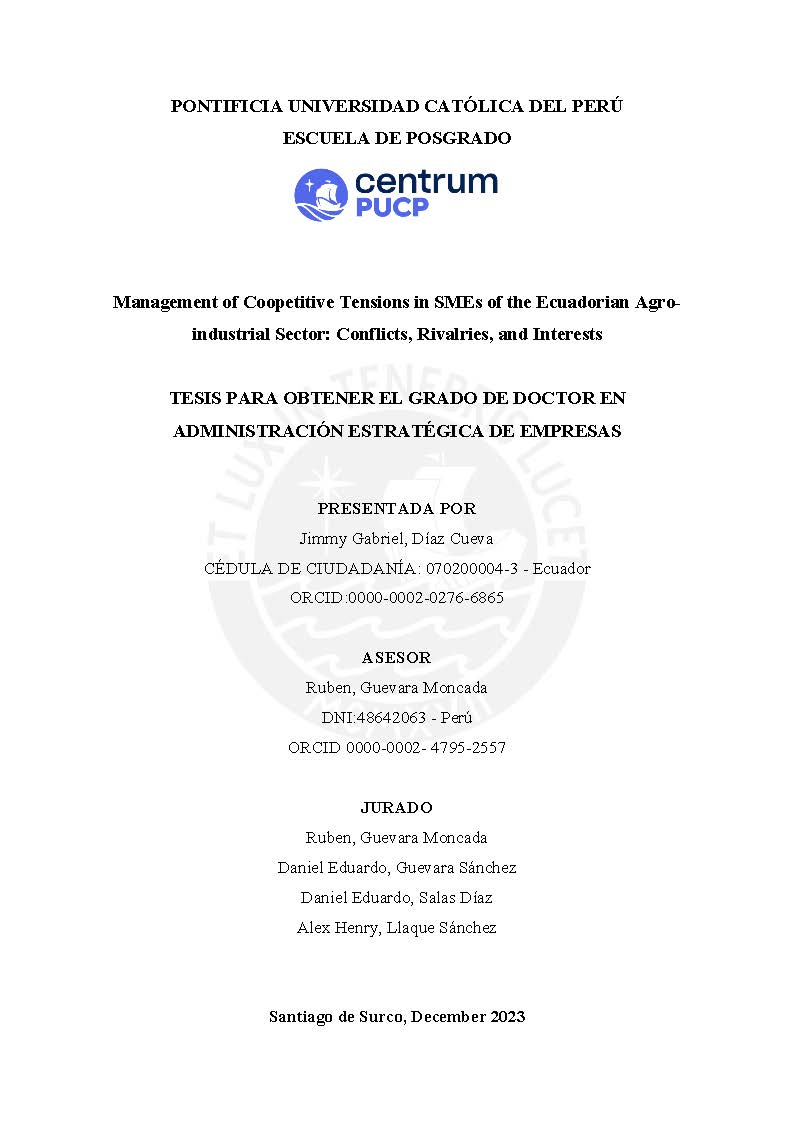| dc.contributor.advisor | Guevara Moncada, Ruben | |
| dc.contributor.author | Díaz Cueva, Jimmy Gabriel | |
| dc.date.accessioned | 2023-12-11T21:18:34Z | |
| dc.date.available | 2023-12-11T21:18:34Z | |
| dc.date.created | 2023 | |
| dc.date.issued | 2023-12-11 | |
| dc.identifier.uri | http://hdl.handle.net/20.500.12404/26678 | |
| dc.description.abstract | La teoría encaminada a explicar el fenómeno coopetitivo sigue sin explicar los factores que
condicionan la forma de gestionar las tensiones y conflictos; más aún en el caso ecuatoriano
en donde no existen estudios que, desde una perspectiva empírica, aborden la forma en que
se manifiesta la paradoja coopetitiva en las pequeñas y medianas empresas. Ante este vacío
de conocimiento, la investigación tuvo el propósito de identificar las fuentes de tensiones
que surgen durante las interacciones coopetitivas entre Pymes del sector agroindustrial del
Ecuador, y conocer los factores que determinan su magnitud, así como las circunstancias
que favorecen o dificultan la gestión de dichas tensiones. El estudio fue realizado desde un
enfoque cualitativo mediante un estudio de casos múltiples en el que participaron 15
expertos en gestión estratégica y 54 ejecutivos pertenecientes a 25 empresas de los
subsectores del banano, cacao, camarón y flores de ese país. Los resultados indican que las
tensiones y conflictos que surgen durante las relaciones coopetitivas interempresariales
derivan de factores unilaterales propios de cada organización, así como también están
influenciadas por circunstancias externas asociadas al sector de actividad y al mercado. La
investigación destaca la importancia de fortalecer la capacidad de gestionar las tensiones
coopetitivas, incluso en presencia de conflictos, rivalidades e intereses divergentes. Esto
implica que las partes interesadas deben desplegar nuevas relaciones basadas en la
confianza, el respeto mutuo y el reconocimiento de intereses legítimos con el objetivo de
compartir recursos, reducir costos y aprovechar nuevas oportunidades de negocios. Las
implicaciones prácticas de los hallazgos resaltan las oportunidades perdidas de crecimiento
y mejora continua, escasa creación de valor compartido y mayor vulnerabilidad a las
fluctuaciones en los mercados internacionales. | es_ES |
| dc.description.abstract | The theory aimed at elucidating the coopetitive phenomenon still falls short in explaining
the factors governing the management of tensions and conflicts, above all explaining how
the coopetitive paradox manifests in small and medium-sized enterprises. Recognizing this
knowledge gap, the research set out to identify the sources of tensions emerging during
coopetitive interactions among exporting SMEs in the Ecuadorian agroindustry. The study
also sought to understand the factors determining the magnitude of these tensions and the
circumstances that facilitate or impede their management. Employing a qualitative
approach, this research was carried out using multiple case studies involving fifteen experts
in strategic management, and 54 executives from 25 companies in the banana, cocoa,
shrimp, and flowers subsectors. The findings reveal that tensions and conflicts arising from
coopetitive inter-business relationships stem from organization-specific unilateral factors,
as well as by external circumstances associated with sector and market dynamics. The study
underscores the significance of enhancing the capacity to manage coopetitive tensions, even
in the presence of conflicts, rivalries, and divergent interests. This necessitates stakeholders
establishing new relationships grounded in trust, mutual respect, and acknowledgment of
legitimate interests, with the objective of resource-sharing, cost reduction, and capitalizing
on emerging business opportunities. The practical implications of the findings highlight
missed opportunities for growth and continuous improvement, as well as reducing the
ability to create shared value, making them more vulnerable to fluctuations in international
markets. | es_ES |
| dc.language.iso | eng | es_ES |
| dc.publisher | Pontificia Universidad Católica del Perú | es_ES |
| dc.rights | info:eu-repo/semantics/closedAccess | es_ES |
| dc.rights.uri | http://creativecommons.org/licenses/by-nc-nd/2.5/pe/ | * |
| dc.subject | Sector agroindustrial--Ecuador | es_ES |
| dc.subject | Pequeñas y medianas empresas--Ecuador | es_ES |
| dc.subject | Competencia | es_ES |
| dc.title | Management of coopetitive tensions in SMEs of the Ecuadorian agro-industrial sector: conflicts, rivalries, and interests | es_ES |
| dc.type | info:eu-repo/semantics/doctoralThesis | es_ES |
| thesis.degree.name | Doctor en Administración Estratégica de Empresas | es_ES |
| thesis.degree.level | Doctorado | es_ES |
| thesis.degree.grantor | Pontificia Universidad Católica del Perú. CENTRUM | es_ES |
| thesis.degree.discipline | Administración Estratégica de Empresas | es_ES |
| renati.advisor.dni | 48642063 | |
| renati.advisor.orcid | https://orcid.org/0000-0002-4795-2557 | es_ES |
| renati.author.cedula | 070200004-3 | |
| renati.discipline | 413038 | es_ES |
| renati.juror | Guevara Moncada, Ruben | es_ES |
| renati.juror | Guevara Sánchez, Daniel Eduardo | es_ES |
| renati.juror | Salas Díaz, Daniel Eduardo | es_ES |
| renati.juror | Llaque Sánchez, Alex Henry | es_ES |
| renati.level | https://purl.org/pe-repo/renati/level#doctor | es_ES |
| renati.type | https://purl.org/pe-repo/renati/type#tesis | es_ES |
| dc.publisher.country | PE | es_ES |
| dc.subject.ocde | https://purl.org/pe-repo/ocde/ford#5.02.04 | es_ES |






